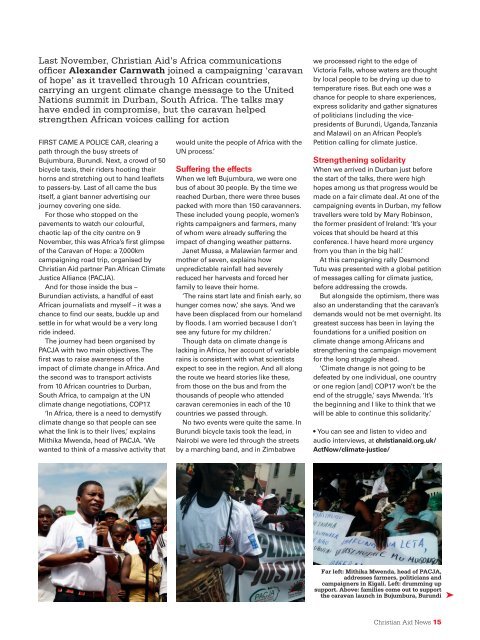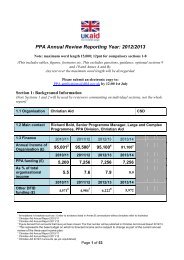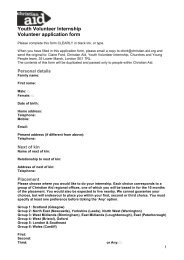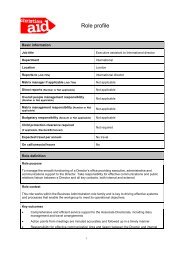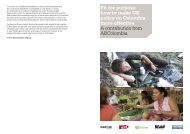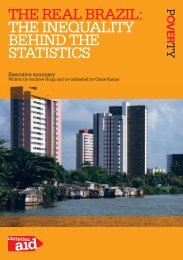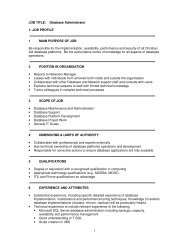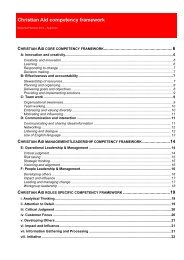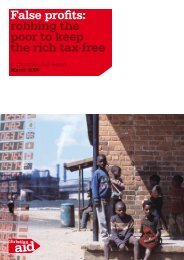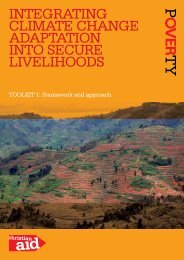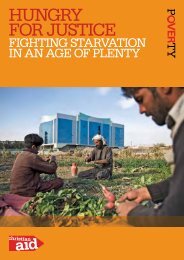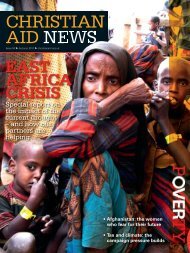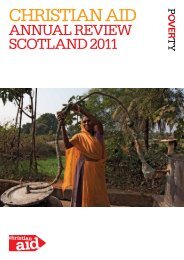CHRISTIAN AID NEWS
CHRISTIAN AID NEWS
CHRISTIAN AID NEWS
Create successful ePaper yourself
Turn your PDF publications into a flip-book with our unique Google optimized e-Paper software.
Last November, Christian Aid’s Africa communications<br />
officer Alexander Carnwath joined a campaigning ‘caravan<br />
of hope’ as it travelled through 10 African countries,<br />
carrying an urgent climate change message to the United<br />
Nations summit in Durban, South Africa. The talks may<br />
have ended in compromise, but the caravan helped<br />
strengthen African voices calling for action<br />
First came a police car, clearing a<br />
path through the busy streets of<br />
Bujumbura, Burundi. Next, a crowd of 50<br />
bicycle taxis, their riders hooting their<br />
horns and stretching out to hand leaflets<br />
to passers-by. last of all came the bus<br />
itself, a giant banner advertising our<br />
journey covering one side.<br />
For those who stopped on the<br />
pavements to watch our colourful,<br />
chaotic lap of the city centre on 9<br />
November, this was africa’s first glimpse<br />
of the caravan of Hope: a 7,000km<br />
campaigning road trip, organised by<br />
christian aid partner pan african climate<br />
Justice alliance (pacJa).<br />
and for those inside the bus –<br />
Burundian activists, a handful of east<br />
african journalists and myself – it was a<br />
chance to find our seats, buckle up and<br />
settle in for what would be a very long<br />
ride indeed.<br />
the journey had been organised by<br />
pacJa with two main objectives. the<br />
first was to raise awareness of the<br />
impact of climate change in africa. and<br />
the second was to transport activists<br />
from 10 african countries to Durban,<br />
south africa, to campaign at the UN<br />
climate change negotiations, cop17.<br />
‘in africa, there is a need to demystify<br />
climate change so that people can see<br />
what the link is to their lives,’ explains<br />
mithika mwenda, head of pacJa. ‘We<br />
wanted to think of a massive activity that<br />
would unite the people of africa with the<br />
UN process.’<br />
Suffering the effects<br />
When we left Bujumbura, we were one<br />
bus of about 30 people. By the time we<br />
reached Durban, there were three buses<br />
packed with more than 150 caravanners.<br />
these included young people, women’s<br />
rights campaigners and farmers, many<br />
of whom were already suffering the<br />
impact of changing weather patterns.<br />
Janet mussa, a malawian farmer and<br />
mother of seven, explains how<br />
unpredictable rainfall had severely<br />
reduced her harvests and forced her<br />
family to leave their home.<br />
‘the rains start late and finish early, so<br />
hunger comes now,’ she says. ‘and we<br />
have been displaced from our homeland<br />
by floods. i am worried because i don’t<br />
see any future for my children.’<br />
though data on climate change is<br />
lacking in africa, her account of variable<br />
rains is consistent with what scientists<br />
expect to see in the region. and all along<br />
the route we heard stories like these,<br />
from those on the bus and from the<br />
thousands of people who attended<br />
caravan ceremonies in each of the 10<br />
countries we passed through.<br />
No two events were quite the same. in<br />
Burundi bicycle taxis took the lead, in<br />
Nairobi we were led through the streets<br />
by a marching band, and in Zimbabwe<br />
we processed right to the edge of<br />
Victoria Falls, whose waters are thought<br />
by local people to be drying up due to<br />
temperature rises. But each one was a<br />
chance for people to share experiences,<br />
express solidarity and gather signatures<br />
of politicians (including the vicepresidents<br />
of Burundi, Uganda, tanzania<br />
and malawi) on an african people’s<br />
petition calling for climate justice.<br />
Strengthening solidarity<br />
When we arrived in Durban just before<br />
the start of the talks, there were high<br />
hopes among us that progress would be<br />
made on a fair climate deal. at one of the<br />
campaigning events in Durban, my fellow<br />
travellers were told by mary robinson,<br />
the former president of ireland: ‘it’s your<br />
voices that should be heard at this<br />
conference. i have heard more urgency<br />
from you than in the big hall.’<br />
at this campaigning rally Desmond<br />
tutu was presented with a global petition<br />
of messages calling for climate justice,<br />
before addressing the crowds.<br />
But alongside the optimism, there was<br />
also an understanding that the caravan’s<br />
demands would not be met overnight. its<br />
greatest success has been in laying the<br />
foundations for a unified position on<br />
climate change among africans and<br />
strengthening the campaign movement<br />
for the long struggle ahead.<br />
‘climate change is not going to be<br />
defeated by one individual, one country<br />
or one region [and] cop17 won’t be the<br />
end of the struggle,’ says mwenda. ‘it’s<br />
the beginning and i like to think that we<br />
will be able to continue this solidarity.’<br />
• You can see and listen to video and<br />
audio interviews, at christianaid.org.uk/<br />
ActNow/climate-justice/<br />
Far left: Mithika Mwenda, head of PACJA,<br />
addresses farmers, politicians and<br />
campaigners in Kigali. Left: drumming up<br />
support. Above: families come out to support<br />
the caravan launch in Bujumbura, Burundi<br />
Christian Aid News 15


